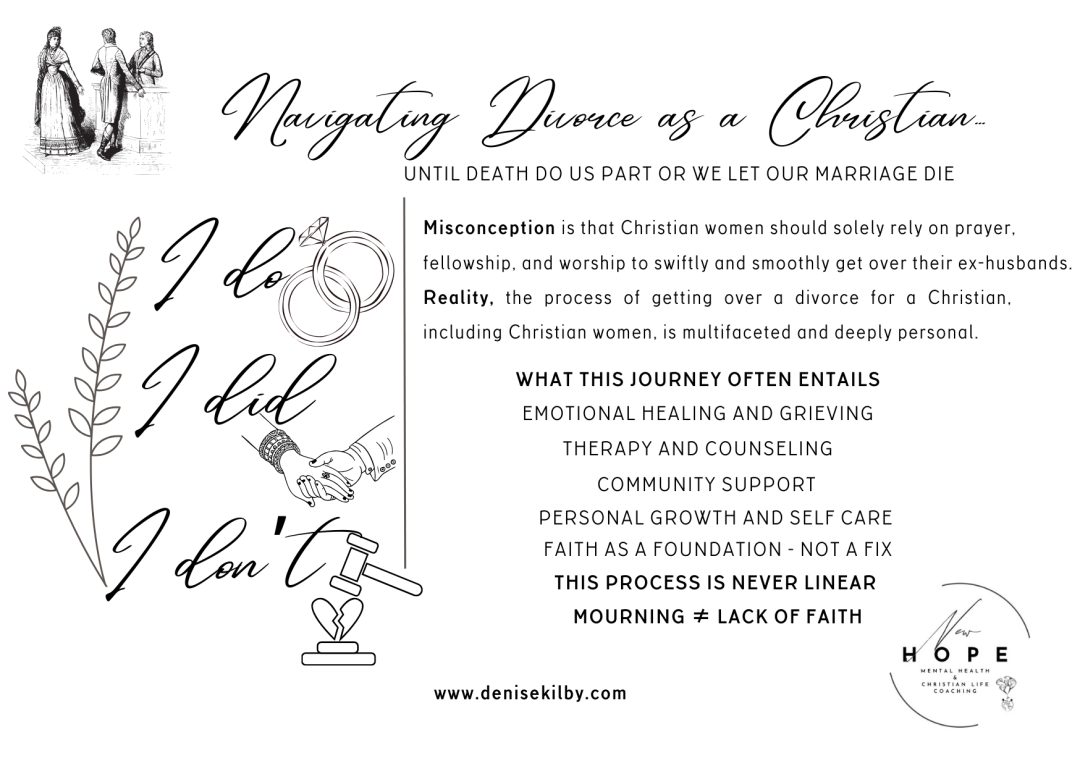Misconceptions about Christian Divorce Recovery
Many people hold specific beliefs about how Christians, especially Christian women, handle the aftermath of a divorce. A common misconception is that Christian women should solely rely on prayer, fellowship, and worship to swiftly and smoothly get over their ex-husbands. This view suggests that their faith alone is a quick fix, providing immediate and complete healing. However, this perception oversimplifies the complex emotional and psychological journey that divorce entails.
The Reality of Christian Divorce Recovery
In reality, the process of getting over a divorce for a Christian, including Christian women, is multifaceted and deeply personal. While faith plays a significant role, it is not a standalone solution. Here’s a closer look at what this journey often entails:
- Emotional Healing and Grieving:
- Pain and Loss: Divorce brings a profound sense of loss, similar to mourning a death. The end of a marriage signifies the loss of a partner, shared dreams, and a way of life.
- Emotional Roller Coaster: Christian women, like anyone else, experience a range of emotions including sadness, anger, betrayal, and confusion. The process of grieving these emotions can be long and non-linear.
- Therapy and Counseling:
- Professional Help: Many Christians seek the help of a professional therapist or counselor. Christian counseling can provide a safe space to explore emotions, develop coping strategies, and work through issues related to the divorce.
- Integrative Approaches: Counseling that integrates faith can be particularly helpful, combining psychological techniques with spiritual support.
- Community Support:
- Beyond Fellowship: While church fellowship provides valuable support, the community aspect extends to family, friends, and support groups. Practical help and emotional support from these networks are crucial.
- Support Groups: Many churches offer divorce recovery groups where individuals can share experiences and find support from others who understand their journey.
- Personal Growth and Self-Care:
- Rediscovering Identity: Divorce often prompts a period of self-reflection and rediscovery. Christian women may explore new hobbies, careers, or educational opportunities to rebuild their lives.
- Self-Care Practices: Engaging in activities that promote mental and physical health, such as exercise, meditation, and healthy eating, are essential parts of the healing process.
- Faith as a Foundation, Not a Fix:
- Sustained Spiritual Practices: Prayer, worship, and fellowship are integral parts of healing, providing comfort, strength, and a sense of community. However, they work best when combined with other forms of support.
- Spiritual Growth: Divorce can be a time of deepening one’s faith. Many find solace in scripture, religious texts, and the teachings of their faith, which offer perspectives on suffering, resilience, and hope.
Debunking the Myths
It’s important to debunk the myth that Christian women get over an ex-husband solely through prayer, fellowship, and worship. While these elements are vital components of their recovery process, they are not the entire story. Recovery from divorce is a holistic journey involving emotional, psychological, social, and spiritual dimensions.
By acknowledging the complexity of divorce recovery, we can better support Christian women and others going through this challenging experience. Encouraging a balanced approach that includes faith, professional help, community support, and self-care can lead to more effective and comprehensive healing.
©️ 2024 Denise Kilby New Hope MHCLC Assoc. All rights reserved.















You must be logged in to post a comment.